- Madagascar
- Antonin Reicha
- Dave Griffiths
- Grigory Samuilovich Frid
- American
- Antonio Pappano
- Rachmaninov and Busoni
- Moszkowski
 DISCUSSION: What is a work? John Dante Prevedini leads a discussion about The performing artist as co-creator, including contributions from Halida Dinova, Yekaterina Lebedeva, Béla Hartmann, David Arditti and Stephen Francis Vasta.
DISCUSSION: What is a work? John Dante Prevedini leads a discussion about The performing artist as co-creator, including contributions from Halida Dinova, Yekaterina Lebedeva, Béla Hartmann, David Arditti and Stephen Francis Vasta.
 DISCUSSION: John Dante Prevedini leads a discussion about Composers, individuals or collective?, including contributions from David Arditti, Halida Dinova, Robert McCarney and Jane Stanley.
DISCUSSION: John Dante Prevedini leads a discussion about Composers, individuals or collective?, including contributions from David Arditti, Halida Dinova, Robert McCarney and Jane Stanley.
Traditional and Modern
Tchaikovsky's 'Eugene Onegin' returns to Rome,
reviewed by GIUSEPPE PENNISI
Eugene Onegin by Pyotr Ilyich Tchaikovsky has returned to Rome after nineteen years. It is an absolute masterpiece of theatre in music of the late nineteenth century. The production is by the Canadian Opera Company; it was conceived for the Metropolitan Opera House in New York. It is directed by Robert Carsen; the scenes and costumes are by Michael Levine, the lighting - an essential element of the production - is by Jean Kalman. I was at the opening night on 18 February 2020 in a packed theater. The Onegin performances in Rome are dedicated to Mirella Freni, who recently passed away and was a great female performer in the 2001 production. This is the fifth time that the work has been seen and heard in Rome.
Sixth of Tchaikovsky's twelve operas, Onegin has only recently had frequent performances in Italy. At La Scala in Milan, for example, there have been just five productions with a total of about thirty performances. The debut was conducted by Toscanini in 1900 and, in January 2006, the last production was imported from the Glyndebourne Festival (where it was premiered in 1994). The opera, however, has been staged in almost all the major Italian opera houses in the last thirty years, mainly in the staging, grand but traditional, produced by the Teatro Comunale di Bologna in 1991. The Bologna production was built on the baritone Paolo Coni, whose short season represented one of the highest moments. Dalibor Jenis has effectively played Onegin in Trieste, Rome and elsewhere. Mirella Freni has been for decades the undisputed and most moving Tatiana. Many Italian editions, and also that of La Scala in 2006, use the score (with a reduced orchestra stave) conceived by Tchaikovsky in 1879 for a few performances (by young performers) at the Moscow Conservatory. The Rome Opera House staging uses the 1885 edition (for large orchestra and experienced voices) for the Bolshoi Theater.
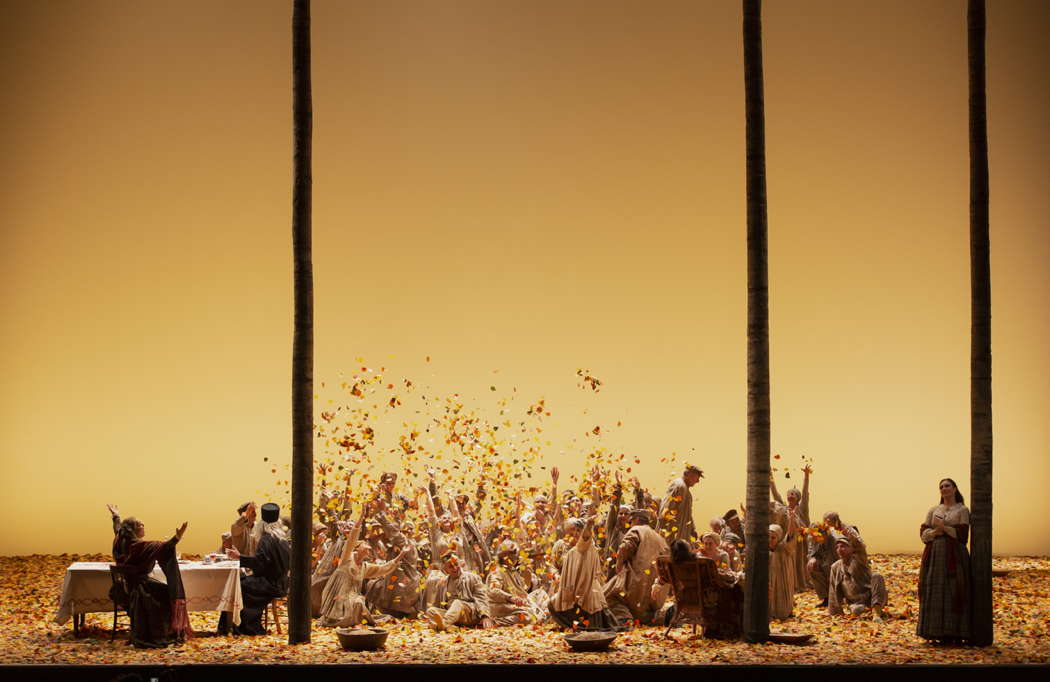
A scene from Tchaikovsky's Eugene Onegin at Teatro dell'Opera di Roma. Photo © 2020 Yasuko Kageyama
A short brief on the plot. Onegin is a young bachelor, too handsome, too alternative and too bright to seize the opportunities that life offers him. He was, for a time, one of St Petersburg's best-known seducers. Now he is just twenty-three years old, and only girls of dubious reputation are looking for him. He is plagued by existential ennui. He accompanies his best friend, the self-declared poet Lensky, to the province, and eschews the love of sixteen-year-old Tatiana. He offends Lensky in public by attempting, at a party, to pretend to seduce Lensky's girlfriend Olga, Tatjana's sister. A duel ensues where, after attempting a reconciliation, he kills Lensky. He repairs abroad for three years. When he tries to find Tatiana again, he is rejected because she is now a mature woman. However still much in love with him, she has decided to remain faithful to her elderly husband. Onegin just keeps living, but now with despair.
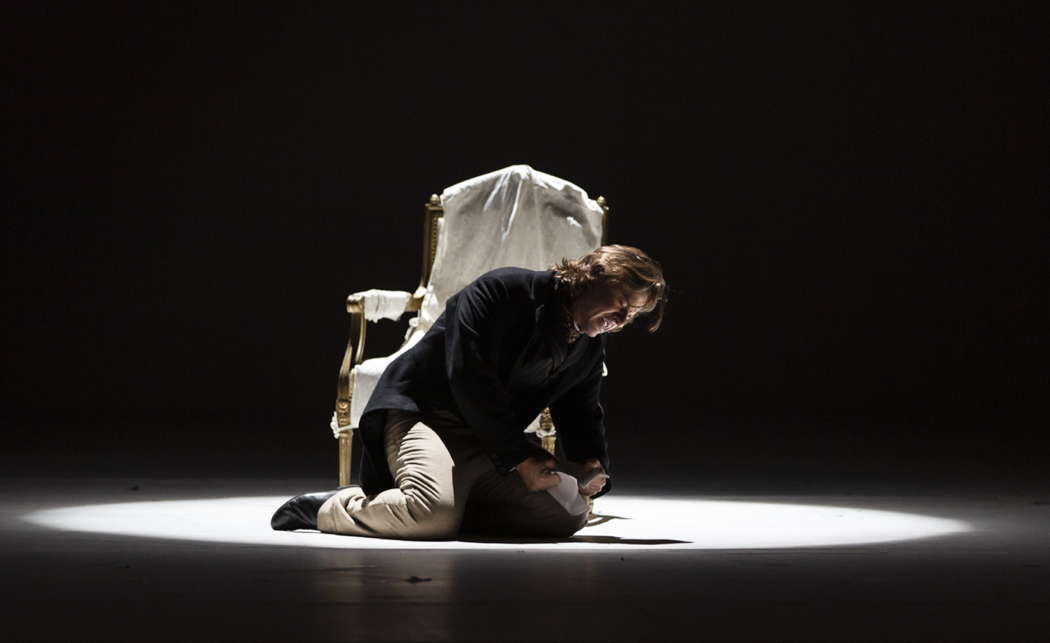
Markus Werba in the title role of Tchaikovsky's Eugene Onegin at Teatro dell'Opera di Roma. Photo © 2020 Yasuko Kageyama
Puskin's verse story and Tchaikovsky's opera focus on the loneliness of the man unable to grasp happiness, even when it is at hand. They also show the contrast between the ferments of the world of the two couples, the oppressive environment of the Russian province and the false and hypocritical environment of St Petersburg, the location of the last act. The plot develops in Imperial Russia between 1820 and 1830, when the first signs of the beginning of the long agony of the Empire are felt.
Onegin also reflects the existential and erotic-sexual crisis of Tchaikovsky more than many of the composer's other works - the attempt to escape from his homosexuality with a 'white marriage' and the madness of his wife when she discovers the tendencies of her husband. It is in this context that among the characters of the music drama, only a young woman, Tatiana, in the 'letter scene', rebels, with an act of total anti-conformism to the society in which she lives, 'to declare' to marry the man she likes, not someone designated by the family.
Tchaikovsky's splendid (and morbid) score looks at the great French and Italian music of the late nineteenth century, distancing itself from the 'Russian national school'. It anticipates, in many ways, twentieth century music, breaking traditional forms and fusing orchestral innovations and bold vocal arias and ensembles with folk and even light music - the dances, especially those of the second act.
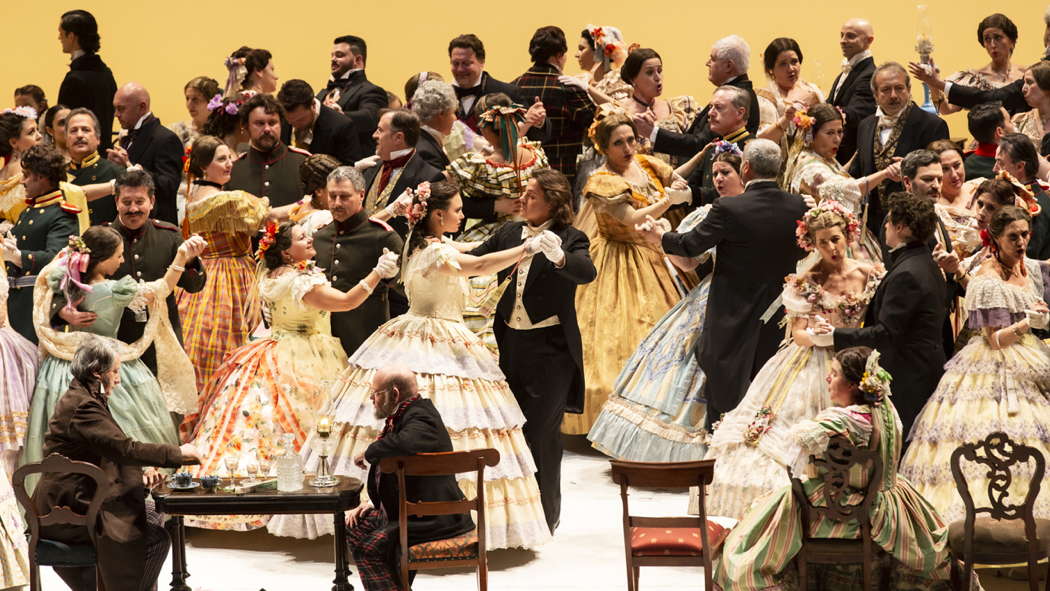
Maria Bayankina as Tatiana and Markus Werba as Onegin (centre) in Tchaikovsky's Eugene Onegin at Teatro dell'Opera di Roma. Photo © 2020 Yasuko Kageyama
The production presented in Rome is, at the same time, traditional and modern. Essential scenes are constructed from few elements, with lighting. High-class costumes have been constructed from Russian paintings of the period. The Rome opera house orchestra is conducted by James Conlon, who specializes in music of the late nineteenth and twentieth centuries. Compared to other productions, such as those by Levine or Fedoseev, it may seem that there is a lack of verve, especially in the initial scenes. In fact, it is imbued with melancholy and ennui de vivre, in line with the spirit of the opera. There was beautiful wind playing, but less brilliant brass, especially horns.
The main character, Onegin, is the baritone Markus Werba, who we remember in various roles by Mozart - Magic Flute - and by Strauss - Capriccio and Ariadne auf Naxos. In his career for years, and therefore no longer very young, he falls perfectly into the role of the rich dandy, about twenty-three years old, unable to grasp the happiness that he has 'at hand'. There was open stage applause several times, especially for the harrowing duet with Tatiana in the third act. Lensky is the Albanian tenor, of Italian formation, Saimir Pirgu, now a star of the Metropolitan Opera. I want to see and hear him more often in Rome. He deserved a long applause after his Act II arioso.
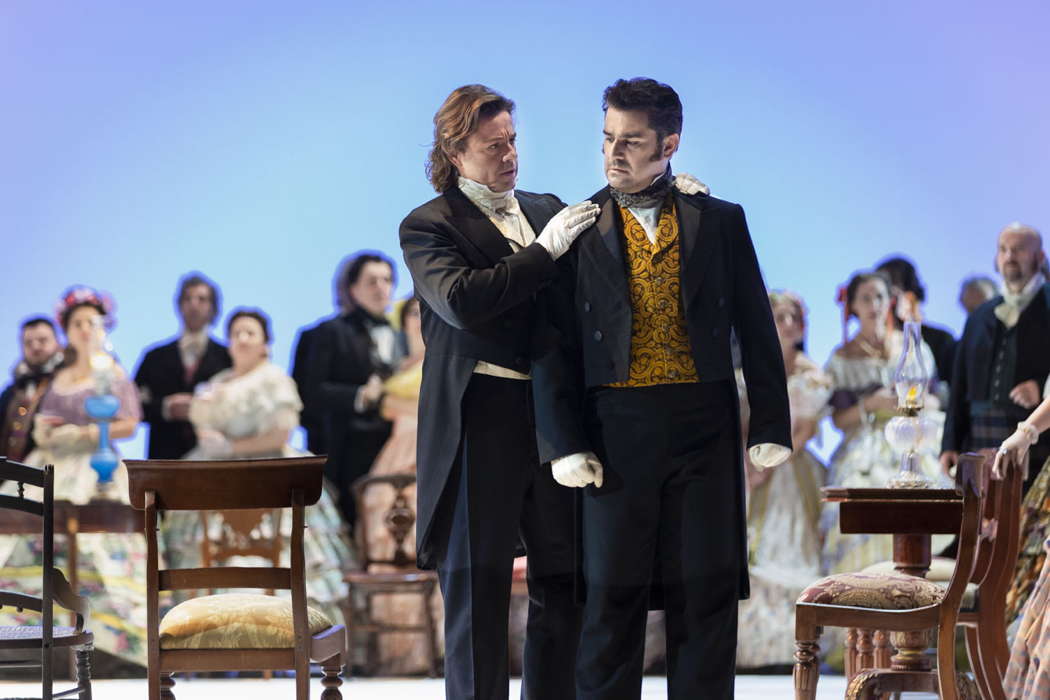
Markus Werba as Onegin (left) and Saimir Pirgu as Lensky in Tchaikovsky's Eugene Onegin at Teatro dell'Opera di Roma. Photo © 2020 Yasuko Kageyama
Tatiana is Maria Bayankina, a young but great soprano from St Petersburg's Mariinsky Theatre. The part fits her perfectly. There was long applause at the end of the Act I letter scene.
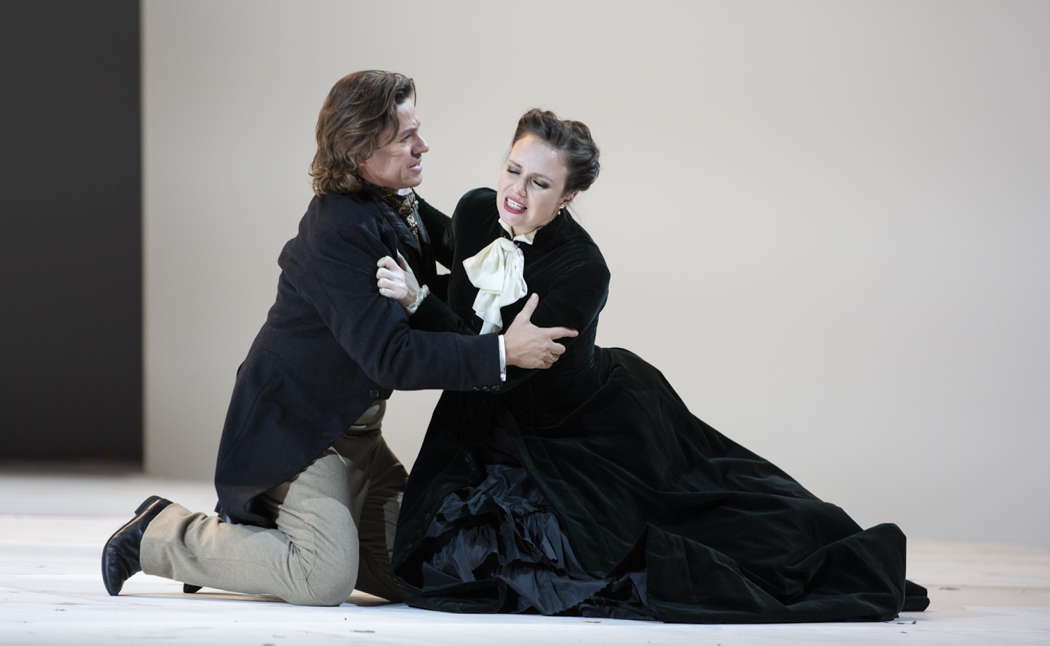
Markus Werba as Onegin and Maria Bayankina as Tatiana in Tchaikovsky's Eugene Onegin at Teatro dell'Opera di Roma. Photo © 2020 Yasuko Kageyama
Prince Gremin, Tatiana's husband, is John Relyea, recently heard in Parsifal in Palermo.
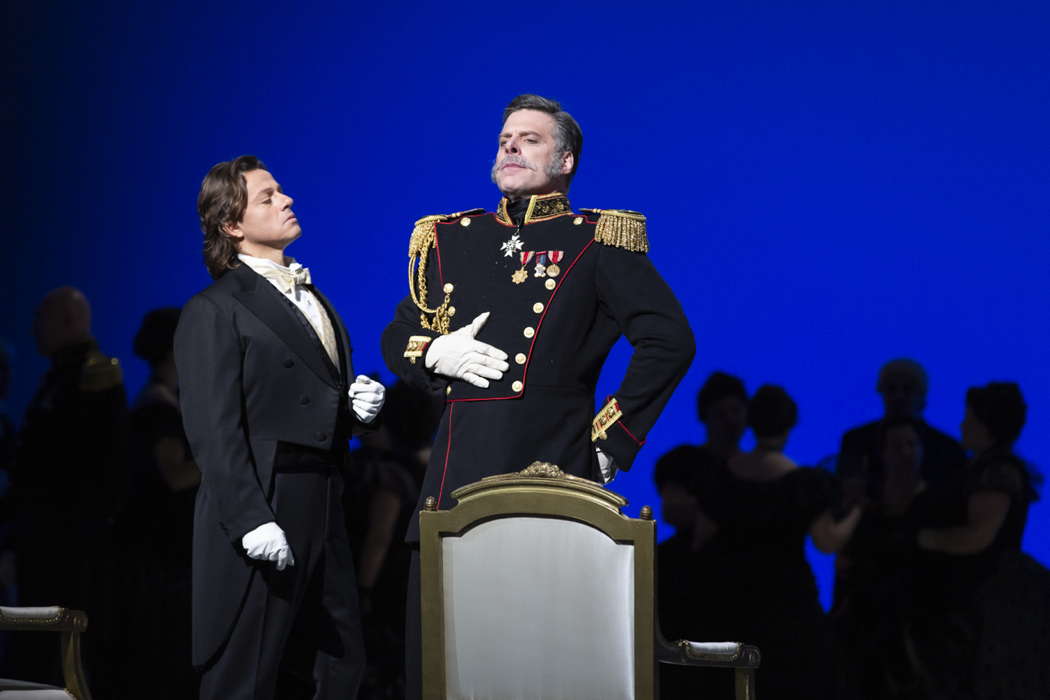
Markus Werba as Onegin (left) and John Relyea as Prince Gremin in Tchaikovsky's Eugene Onegin at Teatro dell'Opera di Roma. Photo © 2020 Yasuko Kageyama
He was warmly applauded after his long Act III aria.
Copyright © 22 February 2020
Giuseppe Pennisi,
Rome, Italy

FURTHER INFORMATION: PYOTR ILYICH TCHAIKOVSKY
FURTHER INFORMATION: MIRELLA FRENI


